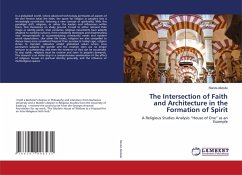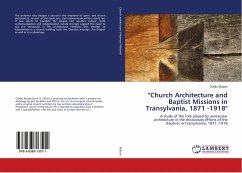
The Intersection of Faith and Architecture in the Formation of Spirit
A Religious Studies Analysis "House of One" as an Example
Versandkostenfrei!
Versandfertig in 6-10 Tagen
40,99 €
inkl. MwSt.

PAYBACK Punkte
20 °P sammeln!
In a globalized world, where advanced technology permeates all aspects of life and finance takes the helm, the space for religion in people's lives is increasingly constricted, fostering a new concept of spirituality. With this paradigm shift, religions, or rather the leaders and influencers within them, find themselves on shaky ground, forced to either rebrand their image or silently perish. Over centuries, religious movements have adeptly adapted to evolving cultures, from revitalizing ideologies and disseminating new interpretations to accommodating community needs and modern world expectat...
In a globalized world, where advanced technology permeates all aspects of life and finance takes the helm, the space for religion in people's lives is increasingly constricted, fostering a new concept of spirituality. With this paradigm shift, religions, or rather the leaders and influencers within them, find themselves on shaky ground, forced to either rebrand their image or silently perish. Over centuries, religious movements have adeptly adapted to evolving cultures, from revitalizing ideologies and disseminating new interpretations to accommodating community needs and modern world expectations. Like other life facets, religions are also compelled to discuss issues once considered beyond their purview.In today's age, religion strives to maintain relevance amidst globalized values where once sacrosanct subjects like gender and the creation story are no longer immune to questioning, and even the existence of God can be scrutinized. To stay viable, religions must be creative and cater to people's demands. This research is an initial step in a comprehensive examination of the effect of religious houses on spiritual identity generally, and the influence of multireligious spaces.














